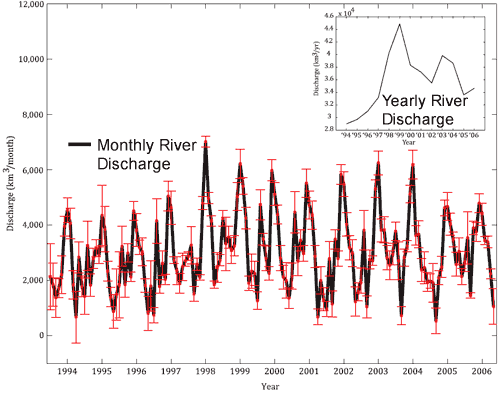
Fig. 1. Monthly variations in global freshwater runoff using various combinations of precipitation and evaporation estimates (solid black line). The Inset shows annual freshwater discharge.
In the global water cycle, fresh water evaporates from the oceans, rains out over land and runs back into the sea. Global warming is expected to intensify this cycle, leading to an increase in river runoff (otherwise known as river discharge). The problem is direct measurements of discharge around the world's rivers are limited. However, a new study takes advantage of advances in satellite measurement techniques (Syed et al 2010, and thanks to PNAS, here's the full paper). Satellite measurements of ocean mass, evaporation and precipitation were combined to create an observation-based estimation of global river discharge. They found that over the period analyzed (1994 to 2006), river runoff has been increasing by about 1.5 percent annually. The global water cycle is intensifying.
The authors use a number of independent estimates of river runoff. Global sea level was measured by satellite altimetry. This was combined with ocean heat and salinity data to determine changes in ocean mass. Gravity measurements by the GRACE satellites were also used to measure changes in ocean mass as well as monitor redistribution of water mass among the different parts of the planet.
Satellite observations of surface wind speed, sea surface temperature and specific humidity of surface air helped to calculate evaporation rates. Satellite and surface radar data plus rain gauge measurements were merged to provide the best available analysis of global precipitation. All these different methods were combined to create an ensemble mean - essentially their best estimate of global river runoff.

Fig. 1. Monthly variations in global freshwater runoff using various combinations of precipitation and evaporation estimates (solid black line). The Inset shows annual freshwater discharge.
According to co-author James Famiglietti, identifying a trend "was a surprise". I'm surprised that they were surprised as increasing runoff is an expected outcome from warming oceans. Perhaps the time period was considered too short or the signal too noisy to expect to find a trend yet. Famiglietti speculates that "the acceleration of water cycle may already be underway". But the authors do advice that the trends should be interpreted with caution over such a relatively short period (1994 to 2006). Longer-term trends will become clearer as more data becomes available over time.
Posted by John Cook on Friday, 8 October, 2010
 |
The Skeptical Science website by Skeptical Science is licensed under a Creative Commons Attribution 3.0 Unported License. |